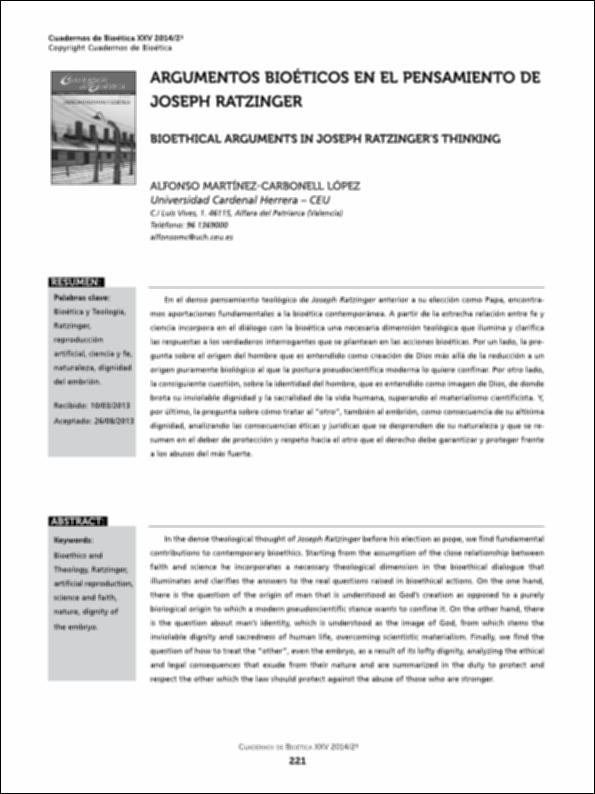Por favor, use este identificador para citar o enlazar este ítem:
http://hdl.handle.net/10637/7540Argumentos bioéticos en el pensamiento de Joseph Ratzinger
| Título : | Argumentos bioéticos en el pensamiento de Joseph Ratzinger |
| Otros títulos: | Bioethical arguments in Joseph Ratzinger's thinking |
| Autor : | Martínez-Carbonell López, Alfonso |
| Materias: | Ratzinger, Joseph, 1927- - Criticism and interpretation.; Ratzinger, Joseph, 1927- - Crítica e interpretación.; Teología natural.; Reproducción asistida humana - Aspectos éticos.; Bioética.; Religion and science.; Religión y ciencia.; Human reproductive technology - Moral and ethical aspects.; Natural theology.; Dignidad.; Bioethics.; Dignity. |
| Editorial : | Asociación Española de Bioética y Ética Médica. |
| Citación : | Martínez-Carbonell López, A. (2014). Argumentos bioéticos en el pensamiento de Joseph Ratzinger. Cuadernos de Bioética, vol. 25, n. 84, p. 221-229. |
| Resumen : | En el denso pensamiento teológico de Joseph Ratzinger anterior a su elección como Papa, encontramos aportaciones fundamentales a la bioética contemporánea. A partir de la estrecha relación entre fe y ciencia incorpora en el diálogo con la bioética una necesaria dimensión teológica que ilumina y clarifica las respuestas a los verdaderos interrogantes que se plantean en las acciones bioéticas. Por un lado, la pregunta sobre el origen del hombre que es entendido como creación de Dios más allá de la reducción a un origen puramente biológico al que la postura pseudocientífica moderna lo quiere confinar. Por otro lado, la consiguiente cuestión, sobre la identidad del hombre, que es entendido como imagen de Dios, de donde brota su inviolable dignidad y la sacralidad de la vida humana, superando el materialismo cientificista. Y, por último, la pregunta sobre cómo tratar al “otro”, también al embrión, como consecuencia de su altísima dignidad, analizando las consecuencias éticas y jurídicas que se desprenden de su naturaleza y que se resumen en el deber de protección y respeto hacia el otro que el derecho debe garantizar y proteger frente a los abusos del más fuerte. In the dense theological thought of Joseph Ratzinger before his election as pope, we find fundamental contributions to contemporary bioethics. Starting from the assumption of the close relationship between faith and science he incorporates a necessary theological dimension in the bioethical dialogue that illuminates and clarifies the answers to the real questions raised in bioethical actions. On the one hand, there is the question of the origin of man that is understood as God’s creation as opposed to a purely biological origin to which a modern pseudoscientific stance wants to confine it. On the other hand, there is the question about man’s identity, which is understood as the image of God, from which stems the inviolable dignity and sacredness of human life, overcoming scientistic materialism. Finally, we find the question of how to treat the “other”, even the embryo, as a result of its lofty dignity, analyzing the ethical and legal consequences that exude from their nature and are summarized in the duty to protect and respect the other which the law should protect against the abuse of those who are stronger. |
| Descripción : | Este es el documento final publicado que se encuentra de forma definitiva en la siguiente URL: http://aebioetica.org/revistas/2014/25/84/221.pdf |
| URI : | http://hdl.handle.net/10637/7540 |
| Derechos: | http://creativecommons.org/licenses/by-nc-nd/4.0/deed.es |
| ISSN : | 1132-1989. |
| Fecha de publicación : | 1-may-2014 |
| Centro : | Universidad Cardenal Herrera-CEU |
| Aparece en las colecciones: | Dpto. Ciencias Políticas, Ética y Sociología |
Los ítems de DSpace están protegidos por copyright, con todos los derechos reservados, a menos que se indique lo contrario.


